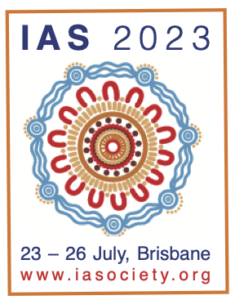REPRIEVE study: statin benefits people living with HIV at low to moderate CVD risk
1 August 2023. Related: Conference reports, Coinfections and complications, IAS 2023 Brisbane.
Simon Collins, HIV i-Base
 Introduction
Introduction
One of the most prominent studies at IAS 2023 was the NIH-funded international phase 3 Randomized Trial to Prevent Vascular Events in HIV (REPRIEVE), which was given a symposium in the programme and was simultaneous published in the NEJM. [1, 2]
The top-line results of a reduction by the statin in reducing cardiovascular events by 35% were reported in HTB in April 2023 when the study was stopped early following a recommendation by the DSMB for efficacy. This is the first time the full results were presented. [3]
The main results were presented by lead investigator Steven Grinspoon from Harvard Medical School. [4]
Related talks covered the implications for the results globally and in women, followed by a panel discussion and open Q&A. [5, 6]
Study design and demographics
From March 2015 to July 2019, REPRIEVE randomised 7769 people living with HIV to either pitavastatin (4 mg day) or matching placebo. Entry criteria included being 40 to 75 years old and having mild to moderate risk of cardiovascular disease (CVD), based on LDL levels in US guidelines. The median screening LDL was 108 mg/dL (IQR: 87 to 128) or 2.79 mmol/L (IQR: 2.25 to 3.31 mmol/L).
The study included 145 sites in 12 countries and was stopped early following a recommendation from the independent Data and Safety Monitoring Board (DSMB) based on early efficacy.
The study was designed to have 85% power to detect a 30% reduction in the risk of a major CVD event (HR: 0.70) in the pitavastatin group on the basis of a maximum of 288 events. The DSMB recommended ending the randomisation after 225 events.
The primary outcome of serious CVD, included CVD death; myocardial infarction; hospitalisation for unstable angina; stroke; transient ischemic attack (TIA); peripheral arterial ischemia, revascularisation of a coronary, carotid, or peripheral artery, or death from other causes.
Baseline characteristics included: 31% women, median age 50 (IQR: 45 to 55), median CD4 count 621 cells/mm3 (IQR: 448 to 827) and viral load <50 copies/mL in 5250/5997 participants (87.5%) with data. Of note, and not mentioned in the presentation, almost half the participants (48%), had a nadir CD4 count <200 cells/mm3. This history is perhaps important for higher CVD risk.
Overall, 41% were Black, 15% Asian and 35% white. In North America, 18% were Hispanic or Latinx.
The majority of participants were cisgender (95%) with 1.6% transgender and data was not reported for the remaining participants.
Participant breakdown by country was: Botswana (n=281), Brazil (n=1099), Canada (n=131), Haiti (n=140), India (n=504), Peru (n=148), South Africa (n=570), Spain (n=213), Thailand (n=590), Uganda (n=181) and the US (n=3787).
Study results
In March 2023, the trial was stopped early for efficacy after a median follow-up of 5.1 years (IQR: 4.3 to 5.9). Overall, 83% (6452/7769) of participants remained in the study, with 74% vs 71% still on their randomised treatment in the active vs placebo arms.
Treatment-related discontinuations occurred in 82 (2.1%) vs 46 (1.2%) and open label statin was started in 223 (5.7%) vs 373 (9.6%), in the active vs placebo groups respectively. Self-reported adherence was >80% each year.
The incidence of primary endpoint of serious CVD events was lower in the statin group with 4.81 vs 7.32 per 1000 person-years (HR 0.65; 95% CI, 0.48 to 0.90; p=0.002). This translated to a number needed to treat (NNTT) of 106 in the study overall. Sensitivity analyses also favoured the statin group and the results were not apparently related to COVID-19.
The reduction was balanced by more cases of diabetes mellitus in the statin group: 206 (5.3%) vs 155 (4.0%) participants (IRR: 1.35; 95% CI: 1.09 to 1.66).
Muscle-related symptoms were also higher, reported in 91 (2.3%) vs 53 (1.4%) in the active vs placebo groups, respectively. Grade 3 or higher were also more frequent (IRR 1.74; 95% CI, 1.24 to 2.45) as were related withdrawals: 44 (1.1%) vs 21 (0.5%).
LDL dropped from a median of 107 to 74 mg/dL (2.77 to 1.91 mmol/L) in the statin group and were unchanged in the placebo arm. This was roughly double the expected drop for reasons that are not yet understood.
For full details please see the open access NEJM paper, together with supplementary material. [2]
comment
These results showed benefits in reducing serious CVD events with a generally good safety profile.
Statins are low-cost drugs (the pitavastatin patent ends later in 2023) and so long as statin choice avoids drug interactions with ART, the same results would be expected with other statins, which have a similar lipid and anti-inflammatory effect.
In the panel discussion following the presentations, many members noted the importance of REPRIEVE as being likely to change treatment guidelines and clinical practice.
The panel also discussed the implications for implementation, focusing on the NNTT supporting wider access.
As with other large randomised studies, REPRIEVE supported a wealth of substudies and future analyses will continue.
References
Unless stated otherwise, references are to the programme and abstracts for the IAS 2023 conference, 23-26 July, Brisbane, Australia.
- The REPRIEVE trial: Developing a cardiovascular disease prevention strategy for people living with HIV.Symposium, IAS 2023
https://programme.ias2023.org/Programme/Session/4435 (symposium)
https://conference.ias2023.org/media-1185-the-reprieve-trial-developing-a-cardiovascular-disease-prevention-strategy-for-people-livi (webcast) - Grinspoon SK et al. Pitavastatin to Prevent Cardiovascular Disease in HIV Infection. NEJM, DOI: 10.1056/NEJMoa2304146. (23 July 2023).
https://www.nejm.org/doi/10.1056/NEJMoa2304146 - Statins reduce heart disease by 35% in the international HIV REPRIEVE study. HTB (6 April 2023).
https://i-base.info/htb/45288 - Grinspoon SK et al. Key REPRIEVE results and the utility of statins among people living with HIV: What have we learned? IAS 2023.
- Bloomfield G et al. Cardiovascular disease among people living with HIV in high- and low-income countries: Can one strategy fit all?
- Zanni M et al. Unique aspects of cardiovascular disease among women with HIV: Lessons from REPRIEVE.
This report was first posted on 24 July 2023.

